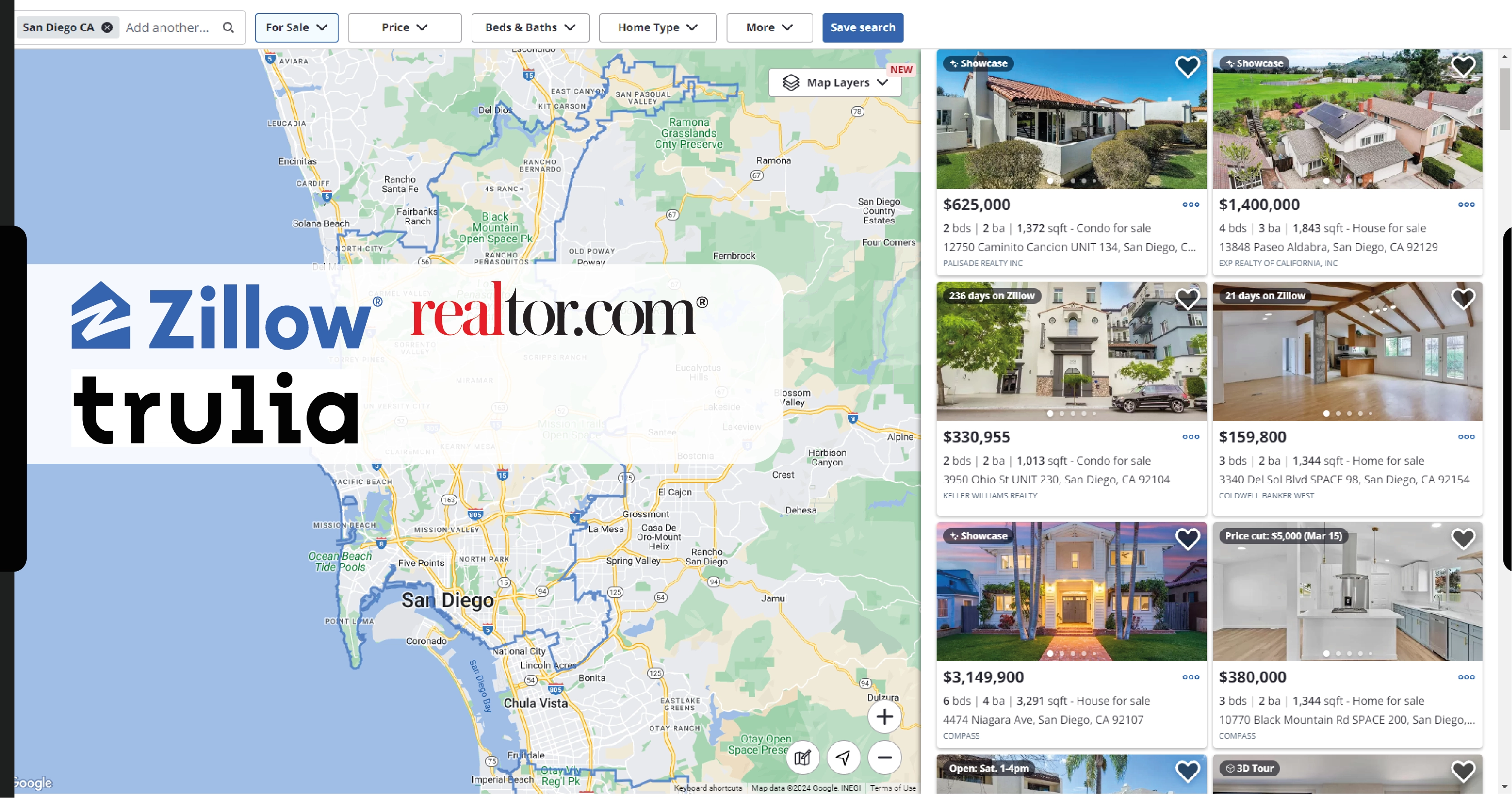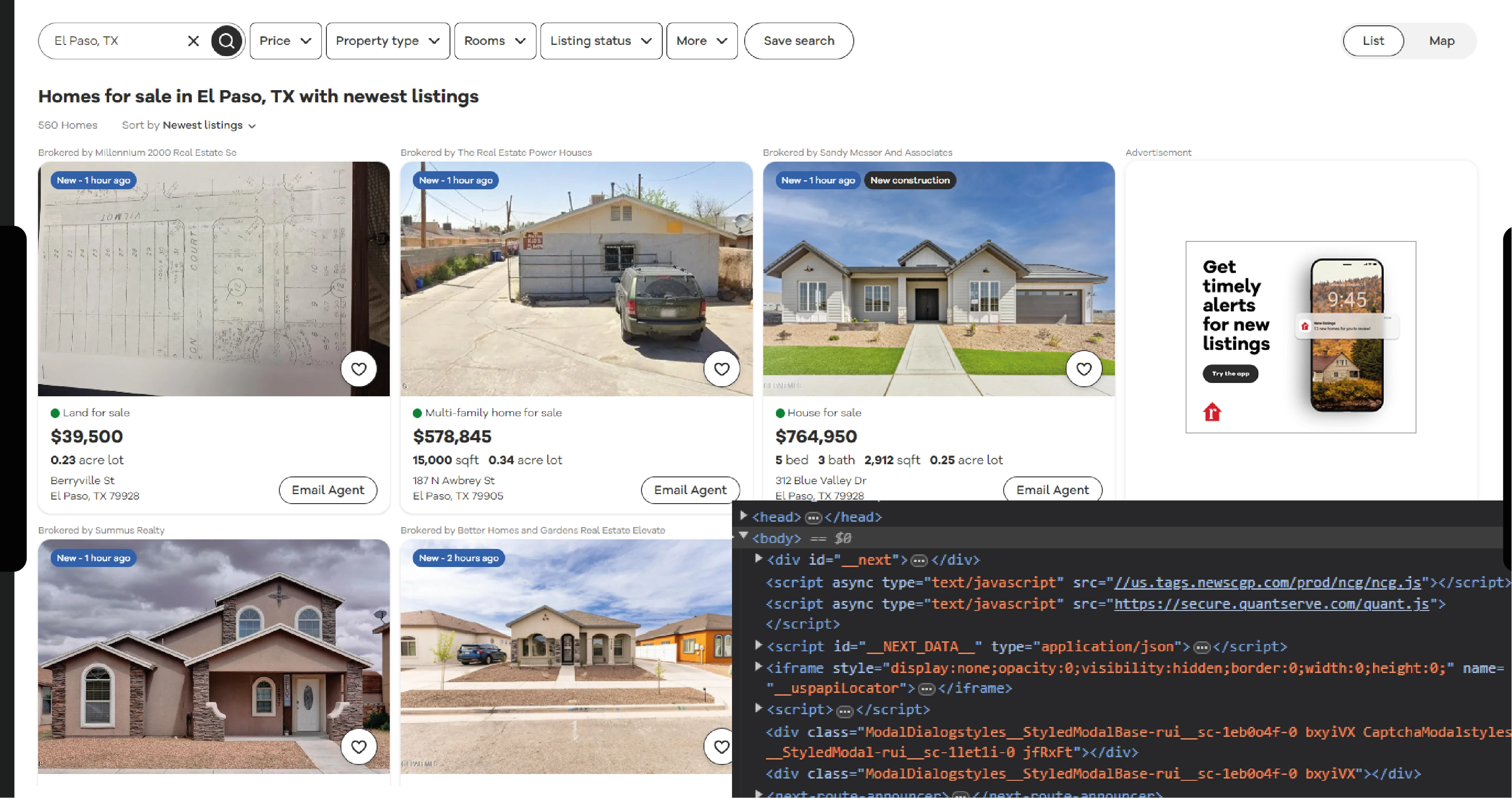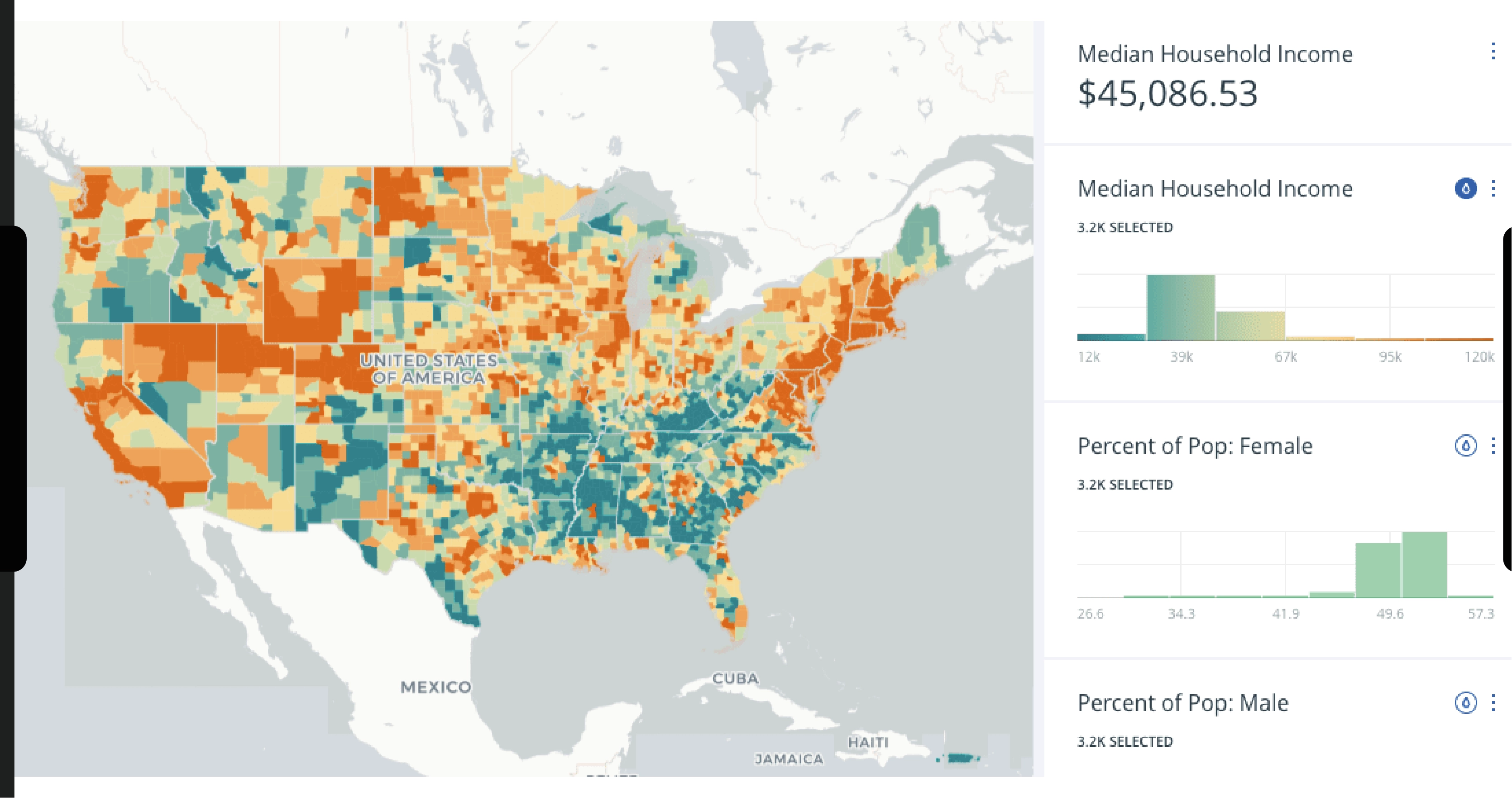.webp)

Introduction
In today's competitive housing market, real estate APIs and web scraping tools have revolutionized data collection. Real estate APIs, designed for user-friendly access to data from various sources, and web scraping tools, which extract valuable information from property listings and market analysis platforms, combine to empower market researchers, real estate agents, and investors. This powerful duo allows for gathering comprehensive data, putting the power of informed decision-making in your hands.
In this digital age, data-driven decision-making is critical and crucial in the housing market. Real estate APIs and web scraping tools are the key to unlocking vast amounts of data from diverse sources, including property listings, market trends, and pricing information.
By harnessing these tools, professionals can conduct thorough market research, analyze price trends, and perform detailed comparisons. This data is the lifeblood of strategic decision-making, and these tools are your lifeline to it.
Whether scraping real estate API data for market research or conducting price comparisons across different listings, the integration of real estate APIs and web scraping technology is a time—and resource-saving boon.
It streamlines the data collection, providing invaluable insights while saving precious time and resources. In an industry where timing and accuracy are crucial, leveraging real estate APIs for web scraping ensures that stakeholders stay ahead of the curve and navigate the housing market seamlessly.
Understanding Real Estate APIs

Real estate APIs (Application Programming Interfaces) allow developers to access and interact with real-time data from various sources within the real estate industry.
These APIs provide a standardized way for applications to communicate and exchange information, enabling seamless integration with third-party platforms and services.
Real estate APIs provide endpoints that developers can query to retrieve specific data, such as property listings, market trends, pricing information, and geographic data.
Developers can use programming languages like Python or JavaScript to send HTTP requests to these endpoints, specifying parameters such as location, property type, and price range.
The API then processes the request and returns relevant data in a structured format, such as JSON or XML, which can be easily parsed and utilized by the requesting application.
The benefits of using real estate APIs for accessing real-time data from multiple sources are manifold:
Access to Comprehensive Data: Real estate APIs provide access to a vast array of data, including property listings, market statistics, demographic information, and more, from multiple sources and databases.
Real-Time Updates: With real estate APIs, developers can access up-to-date information, ensuring that their applications can access the latest market trends, pricing data, and property listings.
Increased Efficiency: By using APIs to access real estate data, developers can automate tasks such as data collection, analysis, and reporting, saving time and resources compared to manual methods.
Enhanced Accuracy: Real estate APIs offer standardized data formats and protocols, reducing the risk of errors and inconsistencies often associated with manual data entry and manipulation.
Scalability: APIs are designed to handle large volumes of data and requests, making them suitable for high-traffic applications and demanding data needs.
Some popular real estate APIs available in the market include:

Zillow API: Provides access to Zillow's vast database of property listings, home values, and market trends.
Realtor API: Offers access to Realtor.com's extensive collection of property listings, neighborhood data, and market insights.
Trulia API: Allows developers to access Trulia's real estate data, including property listings, crime rates, and school information.
Real estate APIs enable developers, real estate professionals, and researchers to access and leverage real-time data for market research, price comparison, and other data-driven applications. Using real estate APIs for data scraping and collection, users can gain valuable insights into the housing market and make informed decisions.
Benefits of Web Scraping in Real Estate

Web scraping in real estate offers numerous benefits, especially when combined with real estate APIs for data collection. Here are the key advantages:
Comprehensive Data Collection: Web scraping, when used with real estate APIs, allows for the extraction of vast amounts of data from various sources, including property listings, market trends, and pricing information. This comprehensive data collection enables in-depth market research and analysis.
Real-Time Updates: By scraping real estate API data and websites regularly, users can stay on top of the latest developments in property listings, market dynamics, and pricing trends. This ensures stakeholders are always armed with current information, empowering them to make timely and informed decisions. Efficient Market Research: Web scraping streamlines the process of gathering data for real estate market research. Instead of manually collecting data from multiple sources, users can automate the process with web scrapers, saving time and resources.
Price Comparison: With web scraping, users can easily compare prices of similar properties across different listings and locations. This allows for more accurate pricing strategies and informed investment decisions.
Enhanced Competitive Analysis: Web scraping enables users to monitor competitor listings, pricing strategies, and market positioning. By analyzing this data, real estate professionals can identify market trends, assess competitive advantages, and adapt their strategies.
Customized Data Extraction: Web scraping tools can be customized to extract specific data points relevant to the user's needs. Users can tailor their data collection efforts to extract the most relevant information, whether it's property features, location amenities, or historical pricing data.
Scalability: Web scraping can be scaled up to handle large volumes of data from multiple sources, making it suitable for applications with diverse data requirements and high data throughput.
Overall, web scraping in real estate, especially with real estate APIs for data collection, offers unparalleled benefits for market research, price comparison, and competitive analysis. By harnessing the power of web scraping, users can gain valuable insights into the housing market and confidently make data-driven decisions.
Choosing the Right Real Estate APIs
When choosing the right real estate APIs for web scraping, several factors should be considered to ensure they meet your specific requirements effectively:
One of the crucial Aspects to consider when selecting real estate APIs for web scraping is data coverage. Opting for APIs that provide comprehensive data, encompassing property listings, market trends, demographic information, and geographic data is essential.
Your APIs should cover the regions and property types pertinent to your target market, ensuring you have all the necessary information. Data accuracy is a paramount factor to prioritize when choosing real estate APIs.
It's crucial to select APIs renowned for providing accurate and reliable data. To gauge the accuracy of the data provided by the API, it's advisable to check user reviews, testimonials, and case studies.
This ensures that the information you rely on for your business decisions is trustworthy and dependable. API reliability is a crucial consideration when selecting real estate APIs.
It's essential to choose APIs that offer high uptime and reliability. This means ensuring that the API provider has a robust infrastructure and provides support for handling high volumes of requests without downtime or interruptions.
This ensures that you have uninterrupted access to the data you need for your business operations. Ease of Integration: Select real estate APIs that are easy to integrate into your existing systems and workflows. Look for APIs with clear documentation, well-defined endpoints, and developer-friendly tools and libraries.
When selecting a real estate API for web scraping, it's essential to assess the pricing models offered. Some APIs may feature tiered pricing, correlating with usage levels, while others might charge based on data volume or API calls.
Implementing Web Scraping for Housing Market Analysis

Implementing web scraping for housing market analysis involves several key steps:
Planning and Research: Define the objectives of your housing market analysis and identify the websites and sources from which you will scrape real estate API data. Consider using real estate API data collection alongside web scraping for comprehensive data coverage.
Data Extraction: Utilize web scraping tools or libraries to extract data from property listing websites. Identify relevant data points such as property details (e.g., price, size, location), listing agent information, and amenities. Employ techniques for dynamic web content, including using XPath or CSS selectors to locate elements.
Data Parsing and Cleaning: Parse and clean data to ensure consistency and accuracy once data is extracted. Remove irrelevant or duplicate information, standardize data formats, and address inconsistencies or errors. This step is crucial for ensuring the reliability of your analysis.
Data Storage: Determine the appropriate storage method for your scraped real estate data. Consider using databases such as MySQL or MongoDB for structured data storage or CSV files for smaller datasets. Ensure that your chosen storage solution is scalable and allows for easy data access and retrieval.
Analysis and Insights: Analyze the scraped real estate data to derive meaningful insights for market research and price comparison. Utilize statistical analysis, data visualization techniques, and machine learning algorithms to identify trends, patterns, and outliers in the data.
By following these steps and best practices, you can effectively implement web scraping for housing market analysis. You can leverage real estate data scraping to gain valuable insights for market research and price comparison initiatives.
Analyzing Real Estate Data

Analyzing collected real estate data involves employing various techniques to extract valuable insights and make informed decisions. Data visualization is a powerful method for presenting real estate data visually, allowing users to identify trends and patterns at a glance. Tools like scatter plots, heat maps, and choropleth maps can be used to visualize property prices, market trends, and geographic patterns.
Statistical analysis enables researchers to delve deeper into the data, uncovering correlations, distributions, and outliers. Techniques such as regression analysis can help identify factors influencing property prices, while clustering algorithms can group similar properties based on various attributes.
Machine learning algorithms offer advanced real estate data analysis capabilities, allowing for predictive modeling and trend forecasting. Models such as linear regression, decision trees, and neural networks can be trained on historical data to predict future property prices or identify emerging market trends.
Real estate data analysis and visualization can provide actionable insights directly applicable to your business. For instance:
Identifying neighborhoods with high potential for property appreciation based on historical price trends and demographic data.
Predicting future rental yields for investment properties using machine learning algorithms trained on rental data.
Understanding the impact of factors such as school quality, crime rates, and proximity to amenities on property prices.
Optimizing pricing strategies for property listings based on market demand and competitor analysis.
By leveraging data visualization, statistical analysis, and machine learning techniques, real estate professionals can gain valuable insights into market dynamics, make informed decisions, and stay ahead in the competitive housing market.
Case Studies and Success Stories
Case Study 1
Company A - Leveraging Real Estate APIs and Web Scraping for Market Research
Challenge: Company A, a real estate investment firm, needed market research to identify lucrative investment opportunities in various cities.
Solution: Company A utilized real estate APIs for web scraping to collect data from multiple sources, including property listings, market trends, and demographic information. They employed a custom-built web scraper to extract data from leading real estate websites and APIs, aggregating information on property prices, rental yields, and neighborhood amenities.
Results: By analyzing the collected data, Company A identified neighborhoods with high potential for property appreciation and strong rental demand. They discovered emerging markets with favorable investment conditions and competitive pricing compared to established areas. Leveraging real estate APIs and web scraping, Company A made informed investment decisions and achieved profitable returns on their real estate portfolio.
Key Takeaways
Real estate APIs and web scraping provide valuable data for market research, enabling companies to identify investment opportunities and trends.
Custom-built web scrapers can enhance data collection efficiency and accuracy, ensuring comprehensive coverage of relevant information.
Analyzing real estate data allows for informed decision-making and strategic investments in the housing market.
Case Study 2
Individual B - Extracting Price Comparison Data with Real Estate Web Scrapers
allenge: ChIndividual B, a first-time homebuyer, wanted to compare property prices across different neighborhoods to find a suitable home within their budget.
Solution: Individual B employed a real estate web scraper to extract pricing data from various property listing websites. They scraped information on property listings, including prices, sizes, and locations, across multiple neighborhoods of interest.
Results: By analyzing the scraped data, Individual B identified neighborhoods with affordable housing options and favorable pricing trends. They compared property prices across different areas, allowing them to make an informed decision on their home purchase. Individual B found a property that met their budget and preferences, thanks to the insights gained from real estate web scraping.
Key Takeaways
Real estate web scraping enables individuals to gather price comparison data and make informed decisions when buying or selling property.
Comparing property prices across neighborhoods helps buyers identify affordable housing options and invest strategically.
Real estate web scraping empowers individuals to navigate the housing market effectively and find the best deals for their needs.
By leveraging real estate APIs and web scraping, companies and individuals can gain valuable insights into the housing market through market research, price comparison, and informed decision-making.
Conclusion
Empower your real estate endeavors with Real Data API. Harness the power of real estate APIs for web scraping to gain invaluable insights into the housing market. Leverage data-driven approaches to make informed decisions and stay ahead in the competitive industry. Explore our comprehensive solutions today and navigate the housing market seamlessly with Real Data API. Take charge of your success!
.webp)
.webp)











